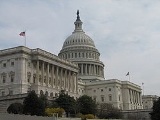|
1794
|
|
2.11.1794
First session of United States Senate open to the public.
|
|
|
1803
|
|
|
1804
|
|
|
1834
|
|
|
1837
|
|
|
1841
|
|
2.18.1841
The first ongoing filibuster in the United States Senate begins and lasts until March 11.
|
|
|
1848
|
|
|
1850
|
|
|
1856
|
|
5.22.1856
Congressman Preston Brooks of South Carolina beats Senator Charles Sumner with a cane in the hall of the United States Senate for a speech Sumner had made attacking Southerners who sympathized with the pro-slavery violence in Kansas ("Bleeding Kansas").
|
|
5.22.1856
Congressman Preston Brooks of South Carolina beats Senator Charles Sumner with a cane in the hall of the United States Senate for a speech Sumner had made attacking Southerners who sympathized with the pro-slavery violence in Kansas ("Bleeding Kansas").
|
|
|
1861
|
|
|
1867
|
|
4.9.1867
Alaska purchase: Passing by a single vote, the United States Senate ratifies a treaty with Russia for the purchase of Alaska. |
|
|
1868
|
|
|
1870
|
|
|
1887
|
|
1.20.1887
The United States Senate allows the Navy to lease Pearl Harbor as a naval base. |
|
|
1899
|
|
|
1900
|
|
1.16.1900
The United States Senate accepts the Anglo-German treaty of 1899 in which the United Kingdom renounces its claims to the Samoan islands. |
|
|
1903
|
|
3.14.1903
The Hay-Herran Treaty, granting the United States the right to build the Panama Canal, is ratified by the United States Senate. The Colombian Senate would later reject the treaty. |
|
|
1907
|
|
|
1911
|
|
8.14.1911
United States Senate leaders agree to rotate the office of President pro tempore of the Senate among leading candidates to fill the vacancy left by William P. Frye's death.
|
|
|
1913
|
|
4.8.1913
The 17th Amendment to the United States Constitution, requiring direct election of Senators, becomes law. |
|
|
1920
|
|
3.19.1920
The United States Senate rejects the Treaty of Versailles for the second time (the first time was on November 19, 1919). |
|
|
1922
|
|
|
1932
|
|
1.12.1932
Hattie W. Caraway becomes the first woman elected to the United States Senate.
|
|
|
1935
|
|
|
1937
|
|
|
1945
|
|
12.4.1945
By a vote of 65 to 7, the United States Senate approves United States participation in the United Nations (the UN was established on October 24, 1945). |
|
|
1947
|
|
|
1948
|
|
9.13.1948
Margaret Chase Smith is elected senator, and becomes the first woman to serve in both the U.S. House of Representatives and the United States Senate. |
|
9.18.1948
Margaret Chase Smith of Maine becomes the first woman elected to the US Senate without completing another senator's term, when she defeats Democratic opponent Adrian Scolten. |
|
|
1949
|
|
|
1950
|
|
|
1951
|
|
5.3.1951
The United States Senate Armed Services and Foreign Relations Committees begin their closed door hearings into the dismissal of General Douglas MacArthur by U.S. President Harry Truman. |
|
|
1952
|
|
3.20.1952
The United States Senate ratifies a peace treaty with Japan. |
|
|
1954
|
|
6.9.1954
McCarthyism: Joseph Welch, special counsel for the United States Army, lashes out at Senator Joseph McCarthy during hearings on whether Communism has infiltrated the Army giving McCarthy the famous rebuke, "You've done enough. Have you no sense of decency, sir, at long last? Have you left no sense of decency?" |
|
12.2.1954
Red Scare: The United States Senate votes 65 to 22 to condemn Joseph McCarthy for "conduct that tends to bring the Senate into dishonor and disrepute". |
|


